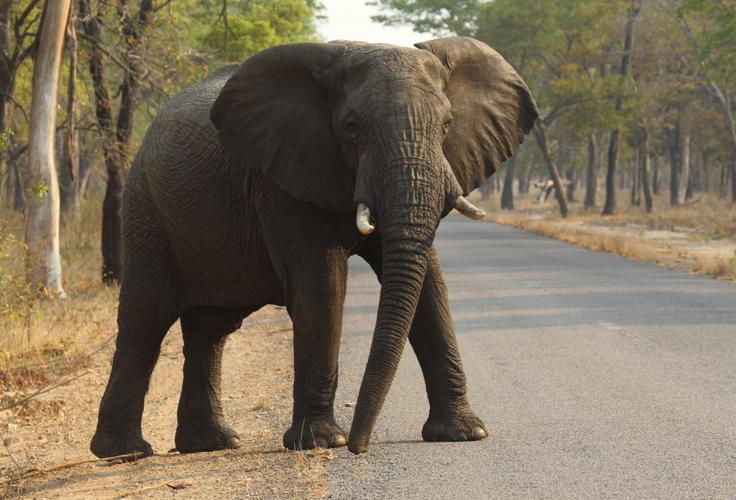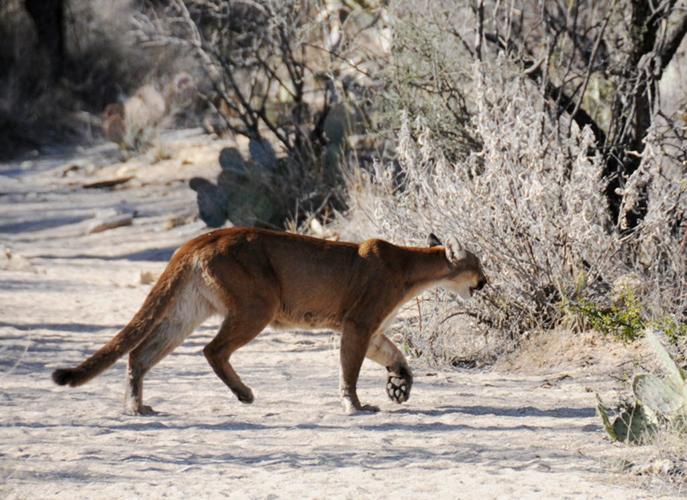When the U.S. government announced its plan to allow the import of elephant parts from Zimbabwe and Zambia to resume, the announcement occurred in an unusual place.
It was at an African wildlife conference hosted by the Tucson-based Safari Club International in Tanzania.
And the reaction to the announcement — celebration by the Safari Club and opposition led by the Humane Society of America — foreshadowed a confrontation we’re likely to have next year in Arizona. Trophy hunting, whether in Africa or Arizona, is ethically intolerable to an increasing share of the American population, and some are trying to kill it off altogether.
That puts Safari Club on the defensive, and it’s reacting by deploying political spending and familiar arguments: That an attack on trophy hunting is an attack on all hunting, as well as an attack on wildlife itself.
We’re likely to hash out this debate next year in Arizona, as the Humane Society backs a proposed ballot initiative to ban all hunting of wild cats, including mountain lions and bobcats. But for now, it’s taking place in the African context, with a Tucson twist.
You may remember that back in 2015, a Safari Club member killed a beloved lion, named Cecil, in Zimbabwe. The club suspended the hunter’s membership, saying he had hunted the lion unethically, but the damage had been done: Millions of Americans became aware of the African trophy hunts engaged in largely by wealthy compatriots.
The club, headquartered at 400 W. Gates Pass Blvd. at its International Wildlife Museum, nevertheless fought the federal government on a separate front: A ban on the importation of elephant parts from Zimbabwe and Zambia. That is the battle the Safari Club thought it had won when the Fish and Wildlife Service made its announcement Nov. 14 reversing the ban.
But an outcry followed, and President Trump, whose sons have gone on elephant hunts in Africa, said his administration will reconsider the decision and make a new announcement this week. Actually, he went further than that in his inimitable way on Twitter:
“Big-game trophy decision will be announced next week but will be very hard pressed to change my mind that this horror show in any way helps conservation of Elephants or any other animal.”
This is the challenge for the Safari Club: Convincing people that hunting of a threatened animal like the African elephants actually helps protect their populations.
The Safari Club’s argument, counterintuitive though it is, goes like this: Trophy hunters spend tens of thousands of dollars per trip. That money goes into the economies of remote areas where residents might otherwise hunt elephants illegally to sell their parts on the international market, or simply to protect their crops and homes. Instead, foreign hunters take animals from areas and populations that the government considers environmentally sustainable, and many of the products, such as meat, stay with the local people.
The U.S. Fish and Wildlife Service actually agrees with the argument that hunting these threatened species benefits the population. That’s why it decided to end the ban on importation in the first place.
But I call the argument counterintuitive for a reason: It has a “we-had-to-burn-the-village-to-save-it” quality. And the Humane Society, of course, says it’s totally bogus.
“In the U.S., no one is allowed to hunt endangered or threatened species,” society President Wayne Pacelle told me. “If we don’t accept that logic in the United States, why would we accept it in places like Zimbabwe or Tanzania?”
Besides, he noted, foreigners also spend millions of dollars a year simply to tour elephant or lion habitat, have an experience, take pictures and go home.
I can’t help but embrace this argument, even though I see the Safari Club’s points. If your hunting money is helping preserve elephants, and that is your priority, why can’t you just spend the money on conserving the species and skip killing them?
The argument will be different next year in Arizona’s debate over the hunting of big cats. That ballot initiative would ban the hunting not just of mountain lions and bobcats, but also of jaguars, ocelots and lynx. Of those latter three, jaguars and ocelots are endangered, so their hunting is prohibited anyway, and lynx are rare in Arizona if present at all.
Perhaps most importantly, mountain lions and bobcats are not endangered. In fact, they and other trophy animals represent a livelihood for people like Dale Robertson of Young, Arizona.
I called Robertson last week, because I saw in the record that he had commented to the Arizona Game and Fish Commission about proposed new regulations on mountain lion hunting.
“My wife and I are both taxidermists,” he said. “When I’m not doing that, I have hounds, and I pursue bobcat and mountain lions for fun.”
Most of the time, Robertson said — 95 percent of the time, he estimated — he doesn’t shoot or otherwise take the cat. Sometimes he has a friend along, and that person will be looking for an animal and will kill it, as permitted under state regulations.
“Mountain lion numbers need to be managed,” he said. “If we don’t take a certain number of cats out of the population, they overpopulate, decimate the prey base, then they come into town” looking for food.
Neither the Humane Society, nor a former Arizona Game and Fish commissioner from Tucson, wildlife biologist Bob Hernbrode, agree with that assessment. The prey base would limit the cats’ population growth even without hunting, Hernbrode said.
Kellye Pinkleton leads both the Humane Society in Arizona and Arizonans for Wildlife, the new group pushing the ban on hunting big cats. She noted that they are purely trophy animals, unlike the elk, deer and game birds that most hunters pursue.
“I have yet to hear a hunter ever say that they eat bobcat,” she said.
Arizonans for Wildlife must gather 150,642 valid signatures by July 5, 2018, to put the ban on the ballot next year.
Echoing the argument about African elephants, Safari Club and some hunters will say that this proposed ban is both counterproductive and a slippery slope toward banning hunting altogether.
The latter is a dubious argument. Even Hernbrode, just back from a five-day elk-hunting trip when I talked to him Wednesday, told me he isn’t inherently opposed to bans on trophy hunts of animals like mountain lions, in part because that’s where public opinion is going.
“I lose more by promoting the hunting of them than I gain by promoting the hunting of them,” he said.
But his successors on the Arizona Game and Fish Commission, which traditionally has close links to the Safari Club, are unlikely to see the issue the same way. They’ll likely point out that hunting and fishing license fees underwrite the Game and Fish Department — to the tune of $33.6 million in fiscal year 2015-2016 — and its management of wildlife species.
And in that sense, they’ll argue that hunting these big cats helps the cats and other wildlife — the same counterintuitive argument used by Tucson’s Safari Club in Africa.






